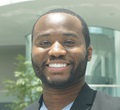Undergraduate Spotlights
 Andrew Asare (B.S. in Economics with Financial Applications, 2015)
Andrew Asare (B.S. in Economics with Financial Applications, 2015)
I am a Public Sector Account Manager for Hewlett Packard Enterprise. Our goal is to deliver data center solutions to Public-Sector clients. Specifically, I support our Public-Sector clients in the Southern California region. Our segment focuses on building and improving the IT infrastructure of State & Local government and Educational institutions across the United States. Sales along with Account Management is a key function of my role. My first year with the HPE I achieved 98% quota attainment. In my 2nd year FY17, I was awarded FY17 Public Sector MVP and achieved 170% Quota attainment.
As an Economics Major one of the most important things I’ve learned is how to view things holistically. During my career I’ve depended on looking at things from a macro-level and also on a micro-level to understand the interconnectedness of our Industry and organization. This approach has allowed me to help our customers in the best way.
Macroeconomics, Microeconomics, Money & Banking, and Financial Economics have been the most useful courses in my employment. I believe an additional Economics/Statistics based course would’ve brought great value. Specifically, a class that has heavy coursework in Excel.
The Hegi Family Career Development Center brought tremendous value to me in my job search and career. I learned about opportunities with Hewlett Packard Enterprise through the career center. I applied through Mustangtrak and I was subsequently connected to the hiring manager.
Just Capital (Conscious Capitalism): I strongly encourage all upcoming Economics graduates and early career SMU Alumni to look into Just Capital. Just Capital is a not-for- profit 501 (C)(3) that ranks the top 100 most just companies in America based on several criteria voted on by the American public and documented corporate behavior.
Just Capital Key Statistics (Source Justcapital.com):
Just 100 Companies:
**On average pay their median U.S. Employee 33% more than other companies.
**Employ on average 38% more workers in the U.S.
**Donate 3.8 times more to charity per dollar of revenue.
**Emit 72% fewer greenhouse gases per dollar of revenue
** Paid 99% fewer environmental fines per dollar of revenue
** Faced 74% fewer employment discrimination cases per dollar of revenue.
Ultimately, this upright behavior by these corporations cost its shareholders nothing. Remarkably, Just 100 companies on average deliver an 8% higher return on equity than other companies. In conclusion, I strongly encourage Undergraduate Economics majors and early career SMU Alumni to look into these 100 companies when considering internship and employment opportunities. Currently Hewlett Packard Enterprise ranks 94th on this list.
For more information watch: TED Talk “Paul Tudor Jones Just Capital”
Special Thanks: Professor Edward Skelton and John Duca Class of 15 Pony Up!
 John Sabo (B.S. in Economics with Financial Applications, 2013)
John Sabo (B.S. in Economics with Financial Applications, 2013)
I work at a small upstream energy company operating in West Texas. My company is backed by Natural Gas Partners, one of the largest energy private equity firms. In my current position I am responsible for treasury, capital markets, hedging, and corporate development functions. Each of these responsibilities allows me to work closely with reservoir engineering, geology, accounting, and corporate finance disciplines.
There were a multitude of lessons, theories, and other micro principles that I studied at SMU. However, the most important lesson was recognizing that we are a part of a greater system that is constantly in flux. Very rarely, if ever, are our decisions made in a vacuum and all outcomes must be weighed with consideration for macro-economic trends. An appreciation for the bigger picture is a prerequisite for any career.
Public Policy and Money & Banking have been the most useful classes in my employment. I wish I had taken Economics of Regulated Industries, as it would have been applicable to the Economics Internship paper I wrote my Spring semester on William Baumol’s theory of Contestable Markets.
What I admire most about the Hegi Family Career Development Center is that it is completely devoted to helping students prepare for life after graduation and finding opportunities best suited for a potential career. Resume building tips, practice interview strategies, job boards, and actual people to consult with are a few aspects that I would have found helpful.